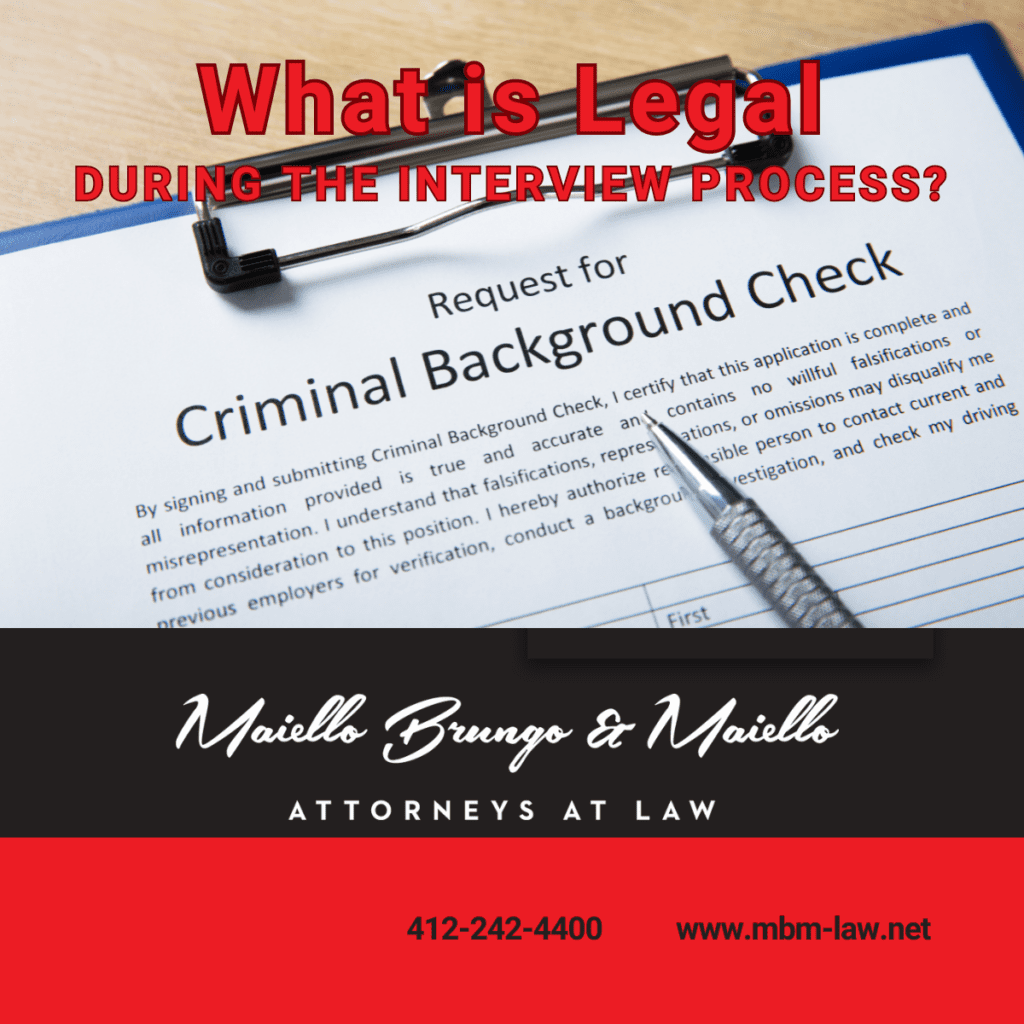As an employer or human resource (HR) department, are you unsure of how to proceed when a background check reveals a criminal record? In today’s hiring climate, now more than ever, navigating background checks to ensure that a credible and trustworthy vetting of a candidate is completed is only half the process, as to what action an employer takes with that information once it is obtained is as critical as its acquisition.
In this article, you will learn how to mitigate risk and make informed hiring decisions. The employment attorneys of MBM Law regularly guide human resource professionals and business owners on navigating applicant review and legal compliance.
Contact the Human Resources Attorneys at MBM Law
Candidate Consent for Background Checks: What PA Employers Need to Know
Pennsylvania is one of many states that has adopted the Fair Credit Reporting Act (“FCRA”), which dictates how consumer reports are used with respect to employment decisions. The FCRA sets the guidelines on the acquisition and the use of a candidate’s background information to maintain the candidate’s privacy and to ensure fairness in the hiring process. Before running a background check on a candidate in Pennsylvania, an employer must obtain written consent from the candidate to do so. The form outlining that consent must be distinct and separate from other written consent(s) from the candidate, and the form must clearly and unambiguously state in no uncertain terms the purpose and scope of the background check, and it must also state that the candidate has a right to obtain a copy of the background check once it is compiled.
Understanding Pennsylvania’s Criminal Conviction Levels and Penalties
Some of the key considerations when evaluating a candidate’s criminal background/record include the nature or the gravity of the offense. In Pennsylvania, the three levels of non-traffic criminal convictions in ascending order of severity are summary offenses, misdemeanor offenses, and felony offenses. Summary offenses are not subdivided, while misdemeanor offenses are further subdivided three times (Misdemeanor of the First Degree, Misdemeanor of the Second Degree, Misdemeanor of the Third Degree) as are felonies. The most serious of each (felony and misdemeanor) are of the first degree, followed by the second degree and then the third degree. Summary offenses are punishable by a maximum possible penalty of up to $300 in fines and 90 days in jail. Misdemeanor offenses vary, but the most serious ones have a maximum possible penalty of 5 years in prison and $10,000 in fines. Felonies, like misdemeanors, also vary in prison term and fines but the most serious offenses have a maximum possible penalty of 20 years in prison and $20,000 in fines (note: there are also a few “super felonies” in Pennsylvania, where the maximum penalties are double the maximum felony penalties).
Does Your Pennsylvania Business Need Legal Assistance with Criminal Background Checks?
Can You Dismiss an Applicant Based on Their Criminal Background?
If someone in Pennsylvania is arrested but not convicted (that is, does not either plead guilty or is not found guilty in a court of law of an offense), then an employer is prohibited from considering an arrest that did not result in a conviction in determining a hiring decision for a candidate. If/when someone is convicted and that conviction is directly related to the position being applied for, then the employer may consider that information in that candidate’s application. “Felony and misdemeanor convictions may be considered by the employer only to the extent to which they relate to the applicant’s suitability for employment in the position for which [they] have applied.” 18 Pa. C.S. §9125(b). A prime example of this would be a bank seeking candidates for a position for a bank teller who have convictions for theft by failure of making required disposition of funds, or a trucking company seeking candidates who have convictions for driving under the influence.
Elapsed time is another consideration, not just for discretionary purposes, but also under the law based on the pay scale of the position being sought by the candidate. The FCRA allows an employer to look for convictions from the past seven years but does not allow an employer to use an arrest without conviction in the past seven years if the position in question is set to earn $75,000 a year or less by the candidate.
Understanding criminal background checks in PA can be very difficult for businesses and HR departments to navigate on their own. Please call the law firm of MBM Law to discuss your employment and Human Resources legal questions: (412) 242-4400
Moving Forward with a Candidate with a Criminal Background Check Record
At this point, if you are still wishing to hire a candidate who has a criminal history, or if you find a candidate having a criminal record in their background check; the following are some of the best practices in how to proceed going forward:
- Be open with the candidate, and make sure the candidate is open with you. Things will get off on the right foot if you are open and honest with the candidate as to what you found in their background check, and if they reciprocate, it may be indicative as to their integrity as a person.
- Make sure you analyze the conviction in relation to the job. Say if someone is convicted of a summary disorderly conduct from college for having an open container at a tailgate party from 15 years ago with no convictions since, and that they are applying to work as a supervisor in your shipping and logistical warehouse. There is always risk, but that risk does seem somewhat limited with that candidate, compared to the examples above with the bank teller and the bus driver.
- Be sure to implement risk mitigation strategies. These can include special trainings, explicit or overlapping supervisions, or having a candidate’s (now employee) access to sensitive information or material be restricted given what is in their background.
- If you are not hiring someone based on their conviction, you must inform them in writing. You are mandated to do so under 18 Pa. C.S. §9125(c). If you do not, you are potentially exposing your business to statutory and punitive damages. This is also required under the FCRA (known as an Adverse Action Notice).
To avoid pitfalls and mitigate risk with applicants with criminal background checks, contact MBM Law.
“Ban the Box” and Fair Chance Hiring: Balancing Safety with Second Chances
The Fair Chance To Compete for Jobs Act (FCA), also known as a “ban the box” law, was passed by Congress and signed by the President in 2021, which now prohibits certain federal employers and federal contractors to ask a candidate about their criminal history prior to an offer being extended; this mainly applies to the three branches of government, but also extends to civil service and defense contractors. Notably, it is not an outright ban on access to a candidate’s criminal records, rather, it does not allow that information to be gleaned from an application or from the interview process.
Protecting Your Company in Pennsylvania: Legal Considerations for HR Departments
Ensuring fair chance hiring practices while mitigating risk can be a complex tightrope walk for Pennsylvania employers and HR managers. MBM Law’s experienced HR attorneys can help you navigate the legal landscape of background checks and help review your hiring practices for compliance.
At MBM Law, we are dedicated to help you navigate this ever-changing, complex field of employment law that can best protect your business interests. Contact us today and we will be happy to help you!


